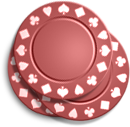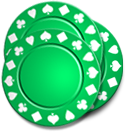



As you learned in the Successful Betting page of this site, bluffing is the act of betting as if you have a better hand than you really do. Poker players bluff in order to get their opponents to fold, and when this strategy is used at the right time and in the right circumstances it can be very effective. Unfortunately most amateur players bluff far too often, leading to their bluffs being called and the loss of money.
Whilst it is impossible to provide a "one size fits all" guide to bluffing (because the effectiveness or otherwise of a bluff will depend on the specific circumstances of the hand and the type of players you are up against) we can make some suggestions about the times when bluffing could reasonably be considered:
Based on the principle that the fewer players there are in a pot, the less chance there is of someone having made a killer hand, you could consider bluffing to get the remaining players to fold as well. This type of bluff is most effective when you have established a reputation for being a tight player, perhaps even showing your opponents strong winning hands even when there is no need to do so. It is certainly not a bluff to make with no reputation to strengthen it, as players will often call you in such circumstances just to see what kind of hand you are holding.
Some players will call to see the turn and river if the flop offers potential for a flush or straight. For example, if there are two suited cards on the flop, players with two hole cards of the same suit will usually pay to see the turn and river in the hope of getting the flush and moving straight into the lead. If the turn and river fail to help potential drawing hands, you can often afford to bluff at the river and the fish will fold.
If everyone at the table checks, the chances are that they don't have much of a hand, if anything. A bluff in last position can therefore cause at least a few of these players to fold, but it is doubtful that everyone will fold. If you bluff at the flop you may also need to bluff at the river and turn to win the pot, and this presents a potentially costly problem - if one of your opponents make a hand you will lose a lot more than you need to have lost.
A "rock" is an extremely tight player who will only call a bet when they are absolutely certain (or as certain as the situation allows) that they have the best hand at the table. Because rocks are used to folding so often they will often fold to your bluff. However, if you bluff and one or more rock calls you, it is probably worth exercising caution - they are likely to have a hand that is big enough to take you out if you aren't careful.
If you had sufficiently strong hole cards to warrant a bet pre-flop and the flop itself doesn't help you, it's important to remember that your opponents aren't psychic. As far as they are concerned, you may well have had a dream flop, so in some cases a bluff here can get you straight to the pot. We say "in some cases" because the flop could have helped one of your opponents, so you need to see what is on the board and then decide whether or not you think a bluff might be prudent.
All poker players know what it's like to be on a roll and win several hands in succession. You can often bluff for a hand or two when your roll comes to an end, and if your opponents don't have anything of merit they will often just fold on the assumption that your cards are still red hot - especially if they've lost a hand or two to you previously. Just be sure to play according to the usual pattern you adopt with a strong hand and be prepared to fold should anyone obviously come back at you with something special.
If everyone except the blinds has folded, a pre-flop bluff could encourage the blinds to follow suit. If they don't, the flop could bring you something worth betting with, or something worth continuing the bluff with. As always, the key here is to know when to stop bluffing and admit defeat.
With a medium or small pair on the board you can try bluffing and hope that none of the other players in the hand have limped in. Players with poor hands will fold if they respect your ability based on previous hands, and you could well take the pot directly. Of course, there is also a chance that someone really does have trips, so tread carefully if your bluff is called.

Having discussed how to bluff, we now need to spend a short while discussing how you can spot a bluff committed by someone else at the table...
If you know when you might be tempted to bluff then you have a better chance of spotting bluffs when they occur. For example, if you would bluff when all players except the blinds have folded, you might be right in thinking that the button is bluffing when he bets with just you (big blind) and the small blind left in the hand. Whether you call or not depends on how bad your hole cards are and how much the other player has bet. In some cases it is sensible to fold even if you are convinced that you are being bluffed so that you can wait for a better hand to strike back with rather than calling an all-in with 49 off-suit.
Here are some specific circumstances to watch out for:
They bet pre-flop and could have hit, but they could just as likely be trying to save face. If you have a hand worth playing with, call or re-raise to see where they really stand.
Making a bet when there is a big pot and the river has made a previously possible hand impossible (for example, a flush) is often an effort to drive out the fish, but it doesn't mean that the bettor actually has anything either. If the pot is big enough to warrant the additional investment and you have a hand worth calling with, do so.
If you've been playing a tight game and there aren't many players in the hand, expect someone to try and bluff you out of it.
If a player makes a bet and then tells you what he has (for example, "Trips aces,") then it is likely they are bluffing. If they really had trips aces they would want you to stay in the hand for as long as possible and call them. A poor bluffer, however, might be tempted to say something like this to scare you off. On the other hand, a really good player may be saying it because he wants you to call. Knowledge of the players is essential here in order to have a good idea about which scenario is most likely.
Knowing when to consider bluffing is one thing, but knowing when to avoid bluffing is just as important. Here are some situations in which bluffing is a definite no-no...
If your full house of kings full of aces has just been beat by aces full of kings, people will be waiting for you to "tilt" on the next hand. Bluffing with a poor hand after a bad loss will almost certainly result in your bet being called or re-raised, so don't do it.
If you've previously bluffed and been caught out, you will need to avoid bluffing for a while and win a few hands on merit before trying again. If you don't do this you might as well just give your chips away.
If the flop comes down A-K-Q then bluffing with your 49 off-suit isn't very sensible. Anyone with an ace, king or queen has a strong pair, and anyone with TJ has a straight. Would you fold such a hand? No, and they won't either.

